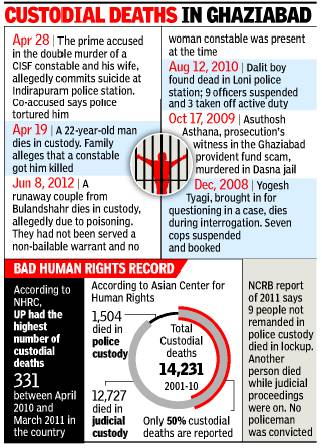Custodial deaths: India
(→2001-16, Gujarat: 180 deaths, no punishment) |
(→2017-19: Delhi) |
||
| (One intermediate revision by one user not shown) | |||
| Line 130: | Line 130: | ||
'' Custodial deaths in Delhi: 2017-19 '' | '' Custodial deaths in Delhi: 2017-19 '' | ||
| − | + | ||
| − | + | ==2018-20== | |
| − | [ | + | [https://epaper.timesgroup.com/Olive/ODN/TimesOfIndia/shared/ShowArticle.aspx?doc=TOIDEL/2021/08/04&entity=Ar01809&sk=92E82816&mode=text August 4, 2021: ''The Times of India''] |
| − | + | ||
| − | + | As many as 348 persons died and 1,189 were tortured in police custody between 2018-19 and 2020-21, the home ministry told the Lok Sabha. | |
| − | + | ||
| − | + | The junior home minister, Nityanand Rai said that as per information received from the National Human Rights Commission (NHRC), 100 deaths in police custody and 236 cases of torture during detention by cops were reported in 2020-21, down from 112 deaths and 411 instances of torture in police custody in 2019-20 and 136 deaths and 542 torture instances in 2018-19. | |
| − | + | ||
| + | The minister’s reply was to Sivaganga MP Karti Chidambaram’s question related to police violence against civilians while enforcing Covid lockdowns. | ||
| + | |||
| + | Rai also said ‘police’ and ‘public order’ are state subjects as per the seventh schedule of the Constitution, with the responsibility of maintaining law and order, including investigation, registration and prosecution of crimes, conviction of accused, protection of life and property etc resting primarily with the respective state governments. | ||
| + | |||
| + | Regarding the sub-query, seeking details of action taken against the offending police officers behind custodial deaths and torture, the home ministry reiterated that ‘police’ and ‘public order’ being state subjects, “the state governments are empowered to deal with such offences which come to their notice as per the extant provisions of the law”. | ||
[[Category:Crime|CCUSTODIAL DEATHS: INDIACUSTODIAL DEATHS: INDIACUSTODIAL DEATHS: INDIA | [[Category:Crime|CCUSTODIAL DEATHS: INDIACUSTODIAL DEATHS: INDIACUSTODIAL DEATHS: INDIA | ||
| Line 146: | Line 151: | ||
CUSTODIAL DEATHS: INDIA]] | CUSTODIAL DEATHS: INDIA]] | ||
[[Category:Name|ALPHABETCUSTODIAL DEATHS: INDIACUSTODIAL DEATHS: INDIACUSTODIAL DEATHS: INDIA | [[Category:Name|ALPHABETCUSTODIAL DEATHS: INDIACUSTODIAL DEATHS: INDIACUSTODIAL DEATHS: INDIA | ||
| + | CUSTODIAL DEATHS: INDIA]] | ||
| + | [[Category:Pages with broken file links|CUSTODIAL DEATHS: INDIACUSTODIAL DEATHS: INDIA | ||
CUSTODIAL DEATHS: INDIA]] | CUSTODIAL DEATHS: INDIA]] | ||
Latest revision as of 19:54, 10 August 2021
This is a collection of newspaper articles selected for the excellence of their content. |
[edit] Custodial deaths
[edit] 2001-16, all India: 26 policemen punished
June 21, 2019: The Times of India

From: June 21, 2019: The Times of India
Just 26 cops convicted for custody deaths in 16 years
India saw 1,557 custodial deaths between 2001 and 2016, the last year for which data from the National Crime Records Bureau is available. Over these 16 years, the number of policemen convicted for custodial deaths is a mere 26, the vast majority of them in UP.
Data compiled from editions of NCRB’s annual publication ‘Crime in India’ shows that over this 16-year period, the largest number of custodial deaths, 362, happened in Maharashtra (see graphic) followed by Andhra, Gujarat, UP and Bengal. These were the only states with over 100 custodial deaths each. Of these, only in the case of UP were there any convictions. UP witnessed 17 policemen being convicted for custodial deaths. None of the other four, including Gujarat, seen even one policemen being convicted for people dying in custody during this period.
Other than these five states, 538 people died in custody. Once again, in most states no policeman had been convicted. The only exceptions to this pattern were Chhattisgarh and MP with four convictions each and Odisha with one.
[edit] 2001-16, Gujarat: 180 deaths, no punishment
June 21, 2019: The Times of India
180 deaths in Guj in 16 yrs, no cop punished
The life sentence given to Sanjiv Bhat and a former constable by a Jamnagar court is a very rare instance of cops getting convicted for custodial deaths in Gujarat. From 2001 to 2016, the latest year for which NCRB data is available, 180 people died in police custody without a single cop being convicted.
Across India, there were 1,557 custodial deaths during this period, for which just 26 cops were convicted, the vast majority of them in UP. Gujarat had the third highest number of deaths in custody, behind Maharashtra (362) and Andhra Pradesh (242). There were no convictions in any of these states.
[edit] 2001-17: no conviction after 2011
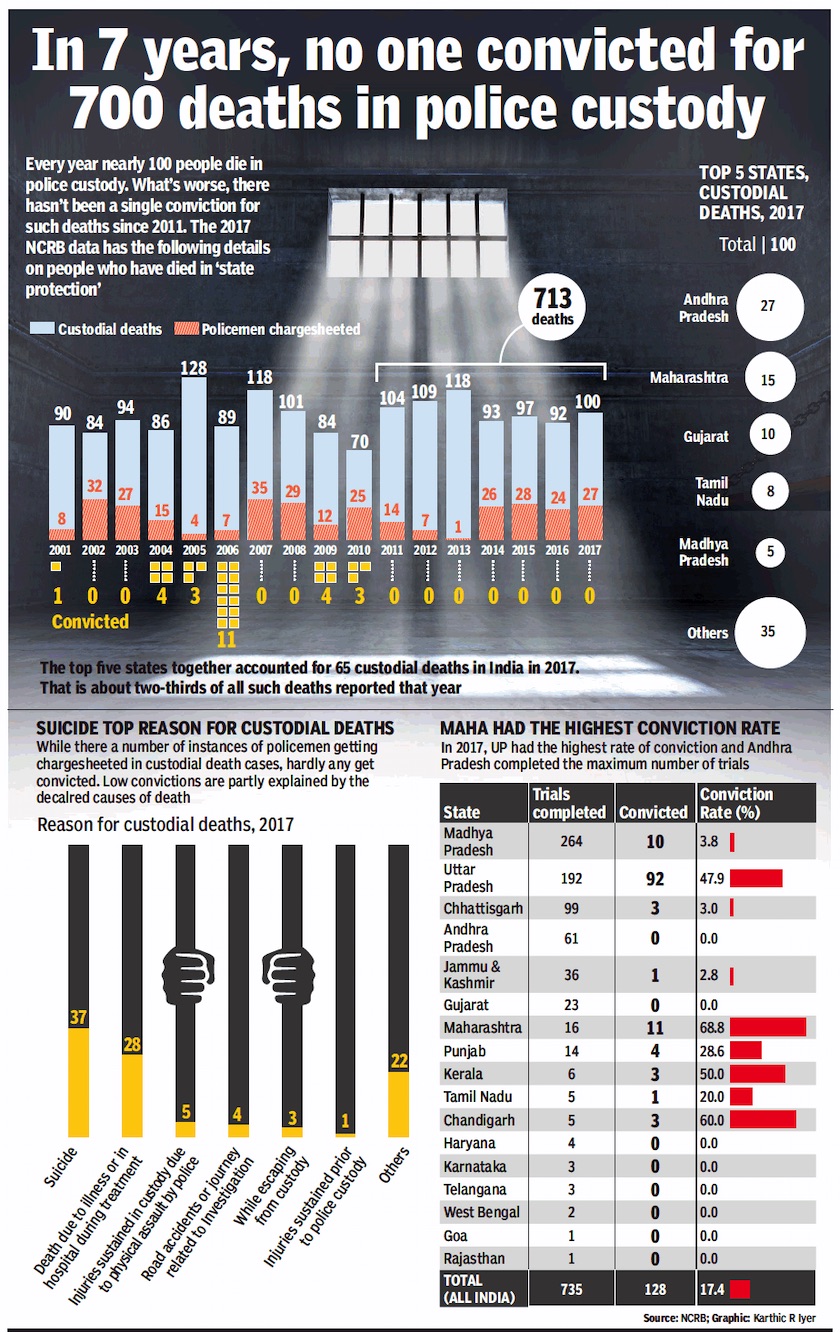
State-wise figures. 2017
Reasons for Custodial deaths
From: Nov 3, 2019: The Times of India
See graphic:
Custodial deaths in India, 2001-17
State-wise figures. 2017
Reasons for Custodial deaths
[edit] 2004
Custodial deaths up by 41% since 2004: Report
TIMES NEWS NETWORK
New Delhi: Slamming the government for its inability to check custodial deaths, a human rights group on Tuesday said the number of deaths had increased by 41.66% since the UPA government came to power in 2004. This includes 70.72% increase in deaths in prison custody and 12.60% increase in deaths in police custody. Incidentally, Maharashtra has to its shame the highest number of custodial deaths followed by Uttar Pradesh and Gujarat.
The Asian Centre for Human Rights (ACHR) in its report ‘Torture in India 2010’ also said that among armed opposition groups, Naxalites were the worst human rights violators and regularly resorted to “violence to life and person in particular murder of all kinds, mutilation, cruel treatment and torture” in blatant violation of international humanitarian laws.
Elaborating on the report, ACHR director Suhas Chakma said the torture of American journalist Joel Elliot by Delhi Police in October 2009 was a case in point. “If a European could be subjected to such torture, what would happen to the common man. The government has failed to address the concerns of the aam aadmi,” he said.
Chakma said torture in India was systematic, institutionalised and rampant. The report said Maharashtra had the highest number of custodial deaths (246) in 2009 followed by UP (165), Gujarat (139), West Bengal (112) and Andhra Pradesh.
ACHR has, however, appreciated the government’s move to introduce the Prevention of Torture Bill but has demanded that the proposed legislation should be put to a public debate and sent to the select parliamentary committee. “Though the Cabinet approved the decision to introduce the Prevention of Torture Bill, 2010, in Parliament and ratify the United Nations Convention Against Torture, the bill is being treated as a state secret,” Chakma said.
[edit] Custodial deaths: 2012
NCRB: Assam tops 2012 list of custodial deaths
No Cops Were Chargesheeted In Those Cases
Pranjal Baruah | TNN
[edit] Assam: most custodial deaths in 2012
Guwahati: Assam recorded the highest number of custodial deaths in 2012, accounting for 11 of 38 such deaths across the country, data released by National Crime Records Bureau (NCRB) said. Andhra Pradesh came second with five custodial deaths, followed by Maharastra with four deaths.
For Assam, the figures come as a shocker as NCRB did not record a single custodial death in the state in 2011. Andhra Pradesh had recorded the maximum of 11 such deaths in 2011 with Madhya Pradesh in the second spot, followed by Mahasrashtra.
“Last year, 11 persons who were in police remand died in lock-ups in Assam. Though autopsy, case registration and magisterial enquiries were conducted in all the cases, no policeman was chargesheeted,” said the NCRB report.
Under fire after the report, the Assam Police have demanded a rechecking of the figures published by NCRB. “We are concerned, but we first need to go through the details of every case,” said Assam Police chief J N Choudhury.
Former state police chief Hare Krishna Deka said, “There should be a thorough study of the cases by the CID, which should prepare a detailed report citing reasons behind the deaths and measures to prevent such incidents.”
[edit] Custodial deaths in Ghaziabad
‘Torture a common probe tactic’
Aniruddha Ghosal TNN 2013/06/16
Ghaziabad: The frequency with which such cases [of death of accused in police custody] are coming to the fore in Ghaziabad has raised serious questions about custodial deaths and violence.
According to lawyers and human rights activists, the problem lies with the use of torture as a common tool of investigation, instead of being employed in exceptional circumstances. “I think the number of people dying in police stations is on the rise, the NHRC and other legislations notwithstanding. Torture takes place when there are no witnesses around,” said K T S Tulsi, senior advocate at the Supreme Court. Experts said torture serves as a shortcut for cops, who try to solve the crime by extracting confessions or clues by roughing up the suspects.
Police themselves admit that torture is quite common, especially in the far-flung, rural police stations away from the glare of the media. “Since the accused will admit anything after a point, torture is commonly used,” said a senior police officer on condition of anonymity.
[edit] DK Basu versus State of West Bengal,1996, Supreme Court
In 1996, the SC, in a case titled DK Basu versus State of West Bengal, set up 11 guidelines for police personnel during detention or arrest. The guidelines, meant to bring transparency and prevent human rights violation, are rarely followed. The problem is rather pronounced in UP, where custodial violence and torture is pervasive. The state registered the maximum number of custodial deaths between April 2010 and March 2011, as per an NHRC report tabled in the Rajya Sabha in December 2011. A total of 331 people died while in custody.
“Torture is conducted by police for two main reasons. They hope to obtain clues in the hope of solving the crime. Secondly, in cases where a confession made to police is acceptable in court, innocent people are often tortured to extract confessions,” said Ashish Khetan, an independent reporter who has published an investigative report on the way custodial torture was used in the investigation of three major bomb blast cases to implicate Muslim youths, and has sent a letter petition to the Bombay high court on the issue.
[edit] 2013-14, deaths and cases of torture in police custody
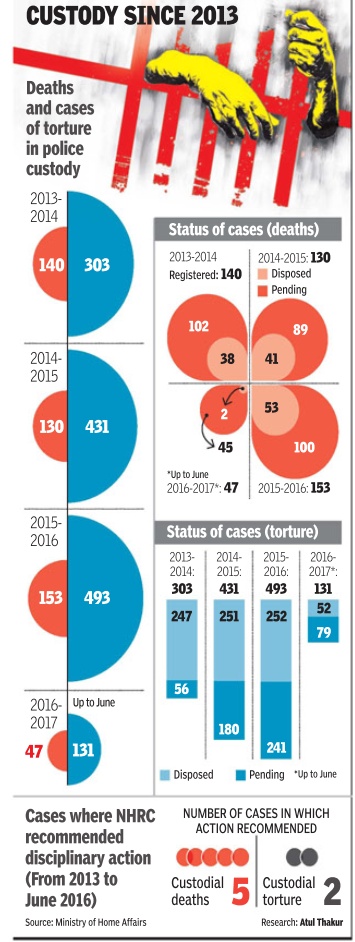
See graphic:
Deaths and cases of torture in police custody, 2013-14
[edit] 2015, deaths and cases of torture in police custody
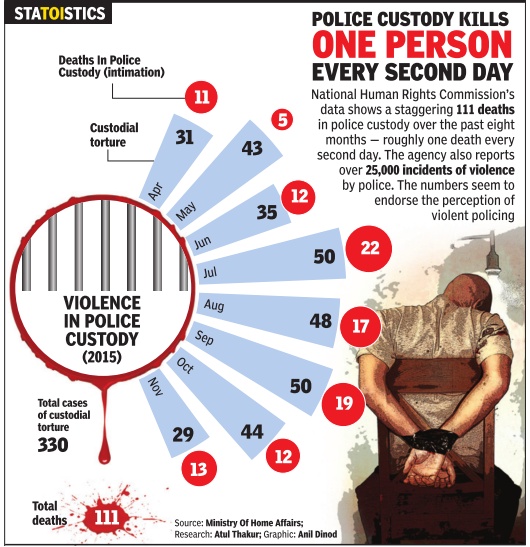
See graphic:
Violence, torture and deaths in police custody, 2015
[edit] 2017-19: Delhi
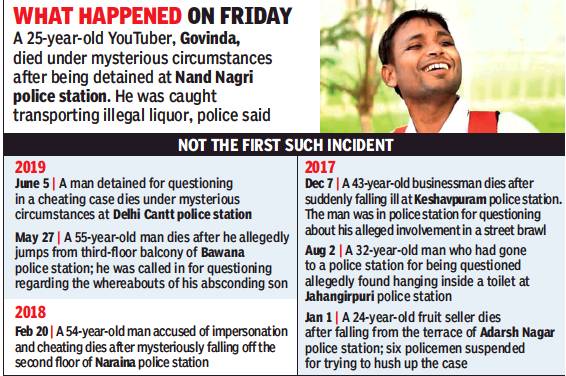
From: June 8, 2019: The Times of India
See graphic:
Custodial deaths in Delhi: 2017-19
[edit] 2018-20
August 4, 2021: The Times of India
As many as 348 persons died and 1,189 were tortured in police custody between 2018-19 and 2020-21, the home ministry told the Lok Sabha.
The junior home minister, Nityanand Rai said that as per information received from the National Human Rights Commission (NHRC), 100 deaths in police custody and 236 cases of torture during detention by cops were reported in 2020-21, down from 112 deaths and 411 instances of torture in police custody in 2019-20 and 136 deaths and 542 torture instances in 2018-19.
The minister’s reply was to Sivaganga MP Karti Chidambaram’s question related to police violence against civilians while enforcing Covid lockdowns.
Rai also said ‘police’ and ‘public order’ are state subjects as per the seventh schedule of the Constitution, with the responsibility of maintaining law and order, including investigation, registration and prosecution of crimes, conviction of accused, protection of life and property etc resting primarily with the respective state governments.
Regarding the sub-query, seeking details of action taken against the offending police officers behind custodial deaths and torture, the home ministry reiterated that ‘police’ and ‘public order’ being state subjects, “the state governments are empowered to deal with such offences which come to their notice as per the extant provisions of the law”.
[edit] Custodial deaths of minorities
Why victims of custodial deaths in Maharashtra only from minorities, Bombay HC asks
Rosy Sequeira,TNN | Aug 1, 2014 The Times of India
Observing that custodial deaths are occurring routinely, the high court added, "It seems to be happening only against certain persons from the minority community."
MUMBAI: The Bombay high court observed on Thursday that the victims of custodial deaths in Maharashtra appear to be only from the minority community.
A division bench of Justices V M Kanade and P D Kode made the remark after they informed advocate Yug Chaudhry of their decision to appoint him as amicus curiae (friend of the court) in a case where a 23-year-old resident of Nalasopara (East) mysteriously died in Thane Central Jail.
Observing that custodial deaths are occurring routinely, the high court added, "It seems to be happening only against certain persons from the minority community." Chaudhry agreed: "I have done my research and it shows that the cases are mostly of Muslims and Dalits." The court questioned why such deaths are happening in Maharashtra. Referring to the case at hand, it said, "It is not reported as a custodial death but as a natural death." The number of such cases is unknown, the court noted.
The same bench had recently handed over the investigation into two custodial deaths to the Central Bureau of Investigation. The first case was of Agnelo Valdaris, who died in the Wadala railway police lock-up this April, and the other case was of Zulfar Shaikh, who died in the Dharavi police lock-up in December 2012. While hearing a third case—of Akash Kharade who died in the Samata Nagar police's lock-up in April this year—the bench had directed the state director-general of police to form a committee to examine cases of custodial deaths and suggest steps to prevent them.
According to the National Crime Records Bureau, 1,418 custodial deaths took place in India between 1999 and 2013, and around 23% of these (or 333) were reported from Maharashtra. For the majority of the 15 years, the state topped the custodial death charts.
The judges said on Thursday that they want to hear all custodial death cases together. They asked Chaudhry to assist the court as "we want to do something about this".
Chaudhry was appointed amicus curiae in a case in which the petition was filed in 2012 by Alia Begum Ansari. According to the petition, Ansari's son Taj Mohammad, a mobile repairer, was arrested by the Sion police on February 21, 2012, for the alleged theft of a mobile phone. He was initially kept in police custody and then transferred to judicial custody, where he died. Alleging that Taj Mohammad was tortured by prison officials, Ansari's petition sought compensation and urged the court to direct CBI to probe the case. In July 2012 Ansari passed away and since then her husband Deen Mohammad is pursuing the case.
[edit] Action against policemen responsible
[edit] 2018/ 1st in India: 2 Kerala policemen to hang
July 26, 2018: The Times of India
1st in India: 2 cops in Kerala to hang for custody death
Scrap Dealer Was Tortured To Death In 2005
In perhaps the first instance of the death penalty being awarded to police personnel in India for custodial death, two Kerala cops were given the highest punishment of the land on Wednesday for the murder of a scrap dealer who was subjected to thirddegree torture.
The death penalty by a CBI court comes on a day when the killing of Rakbar Khan in Alwar continues to make headlines over the alleged role played by police. Rajasthan home minister has said that Rakbar died in police custody while the state’s DGP had admitted an error of judgment.
Scrap dealer Udayakumar, 28, was picked up in a theft case in September 2005 but released as he was innocent. However, when he demanded the return of the Rs 4,000 he had on him, the two cops took him to Fort police station in Thiruvananthapuram and tortured him.
Court also imposed a fine of ₹2L on convicted cops
Giving the death penalty to assistant sub-inspector K Jithakumar and civil police officer S V Sreekumar, judge J Nazer said in his verdict: “This is a brutal and dastardly murder by accused (number) one and two... The acts of the accused persons would definitely adversely affect the very institution of the police department... And if the faith of the people in the institution is lost, that will affect public order and law and order of the society and it is a dangerous situation.” Both the cops were posted as constables at Fort police station at the time of the crime on September 27, 2005. The court also imposed a fine of Rs 2 lakh each on them.
Three other accused in the case — T K Haridas, E K Sabu and Ajit Kumar — have been sentenced to three years in jail for destruction of evidence and conspiracy. Haridas is currently deputy superintendent of police, while the other two had served as superintendents of police.
[edit] The legal position
[edit] Proving custodial death is tough
Somreet Bhattacharya, June 8, 2019: The Times of India
Proving custodial death is tough. The Supreme Court has repeatedly noted that producing evidence against police is very difficult because officers investigating those cases do not proceed with haste against their own colleagues.
The D K Basu guidelines that the police are supposed to follow while detaining a suspect are often ignored. These include conducting a medical check-up immediately after detention and keeping a family member or friend of the suspect in the loop.
This wasn’t so in the case of Govinda. Even in the death of a 55-year-old man at the Bawana police station last month, which police say was a suicide, the family had alleged that they had been kept in the dark about him till the afternoon. He had also been left unattended in a room.
The Criminal Procedure Code is not followed either. According to the National Crime Records Bureau, 591 deaths happened in police custody between 2010 and 2015. But the police labelled most of these as suicides and deaths due to illness or other natural causes. Of the 97 custodial deaths reported in 2015, police records list only six due to physical assault by police; 34 are listed as suicides, 11 as deaths due to illness, nine as natural deaths, and 12 as deaths during hospitalisation or treatment. But in many such cases, the families alleged that death occurred due to torture.
In December 2017, Human Rights Watch, a research and advocacy group, released a report on illegal detentions and custodial torture in the country. The report underlined that proper procedures were crucial to prevent the assault of a suspect or death in custody. Legal and civil rights experts agree that torture is very likely in most cases and it is done with various objectives: frequently to get information about the criminal’s associates, sometimes to extort money from the suspect, and also to scare the detainee into giving up illegal behaviour.
The report also highlighted a high court’s observations that families of victims seeking justice often faced intimidation and threats. Many of these families are poor and socially marginalised, making them especially vulnerable to such harassment.
The report also questioned the way India’s various human rights commissions worked. “The national and state human rights commissions have largely failed in their oversight role in cases of custodial killings,” the report said. “Between April 2012 and June 2015, of the 432 cases of deaths in police custody reported to NHRC, the commission recommended monetary relief of about Rs 22,910,000, but recommended disciplinary action in only three cases and prosecution in none.”
NHRC is empowered to summon witnesses, order production of evidence and recommend that the government initiate prosecution of officials. But in practice, it mostly limits itself to calling on the government to provide compensation or other interim relief.
